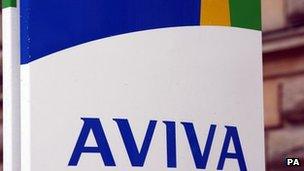Aviva spanked on pay
- Published
- comments

The insurer Aviva has lost a vote on executive pay at its shareholder meeting
It is a very unusual event for a FTSE100 company to be defeated in shareholder votes on what they pay their top executives.
In the decade since shareholders obtained the right to vote on what public companies have paid their senior people for the past year and what they plan to pay them for the coming year - the contents of the so-called remuneration report - just three FTSE 100 businesses have lost the votes (according to research by Manifest).
And one of those defeats was an anomaly, because it involved the Treasury's investment arm, UKFI, expressing displeasure at the payments by Royal Bank of Scotland to the departed management of that troubled bank (since UKFI owns a majority of RBS's shares, once it decided to vote against, the issue was decided).
The two other companies to have lost such votes were GlaxoSmithKline in 2003 and Royal Dutch Shell in 2009.
So Aviva becomes the fourth big company to suffer this humiliation.
What shareholders did not like was a 4.8% pay rise for Aviva's chief executive, Andrew Moss, which would have taken Mr Moss's basic pay to just over £1m - and which Mr Moss said earlier this week that he would now not be taking.
They also disliked a £2m signing-on payment for the insurance executive Trevor Matthews: Aviva can't force him to give up this payment, but it has said it will consult shareholders on "how to compensate future joining executives for the loss of entitlement from their previous role".
'Powerful symbolic value'
The point about these votes is that they have powerful symbolic value - though they only have advisory status and can be ignored by companies.
However the Business Secretary Vince Cable is consulting on legislation to make votes on the prospective pay of executives binding.
The important background is that pension funds and life insurance companies are increasingly determined to rein in pay they deem to be excessive (and yes I have spotted the contradiction that Aviva itself does have a savings business).
These institutions manage the savings of millions of people, and they've noticed that their savers are increasingly hot under the collar about rewards not justified by performance.
We've seen this recently in the vote by more than a quarter of Barclays' shareholders against its remuneration report, and 16% today against Reckitt Benckiser's remuneration report.
Meanwhile at the giant Swiss bank UBS, more than a third of shareholders voted against the rewards for its senior bankers.
Or to put it another way, all companies are being put on warning that they take extra care to only award huge pay when managers are seriously enriching the owners.